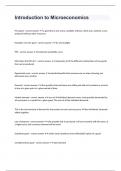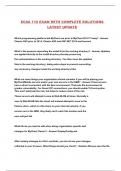Free good - correct answer ✔✔a good that is not scarce; available without a limit and a without a cost; produced without other resources
Examples of a free good - correct answer ✔✔Air and sunlight
PPC - correct answer ✔✔production possibility curve
What does the PPC do? - correct answer ✔✔represents all of the different combinations of two goods that can be produced
Opportunity cost - correct answer ✔✔potential benefits that someone out on when choosing one alternative over another.
Demand - correct answer ✔✔the quantity that purchasers are willing and able (of a product or service) to buy at a given price in a given period of time.
Market demand - correct answer ✔✔sum of all individual demand curves; total quantity demanded by all consumers in a market for a given good; The sum of all the individual demands. This is the total amount of demand for the product at each and very price. All the individuals' demands added together.
Law of demand - correct answer ✔✔the quantity that is purchased, will vary inversely with the price; at a higher price, the consumer demand will be lower.
Substitute good - correct answer ✔✔similar (and sometimes more affordable) option of a good
Complementary good - correct answer ✔✔joint demand Example of complementary goods - correct answer ✔✔cereal and milk, phones and phone cases
Supply - correct answer ✔✔the quantity of a good or service that a producer is willing and able to supply
onto the market at a given price in a given time period.
Shape of the supply curve - correct answer ✔✔the relationship between the price and quantity is directly proportional and they a positive correlation.
Market supply - correct answer ✔✔total quantity of goods and services that producers are willing to supply at a particular price point or range for a certain period of time.
Law of supply - correct answer ✔✔states that an increase in the price of good or services results in an increase in their supply; as the price of a product rises, so businesses expand supply to the market.
Reasoning for the law of supply - correct answer ✔✔The fundamental reason why supply curves are drawn as sloping upwards from left to right is the profit motive; 1. At higher prices, it becomes more profitable for businesses to increase their output
2. If prices fall, it becomes less profitable for businesses to supply the market and they will produce less
Causes of shifts in the market supply curve - correct answer ✔✔1. Changes in the unit costs of production
Lower unit costs mean that a business can supply more at each price - for example higher productivity - rightward shift in supply
Higher unit costs cause a leftward shift of supply e.g. a rise in wage rates or an increase in energy prices /
other raw materials
2.Prices of related goods - joint supply and competitive supply (find out!)
3.Future price expectations 4.Advances in production technologies - better productivity
5.The entry of new producers into the market - the number of producers
6.Favourable weather conditions* e.g. for agricultural products
7.Taxes, subsidies and government regulations




